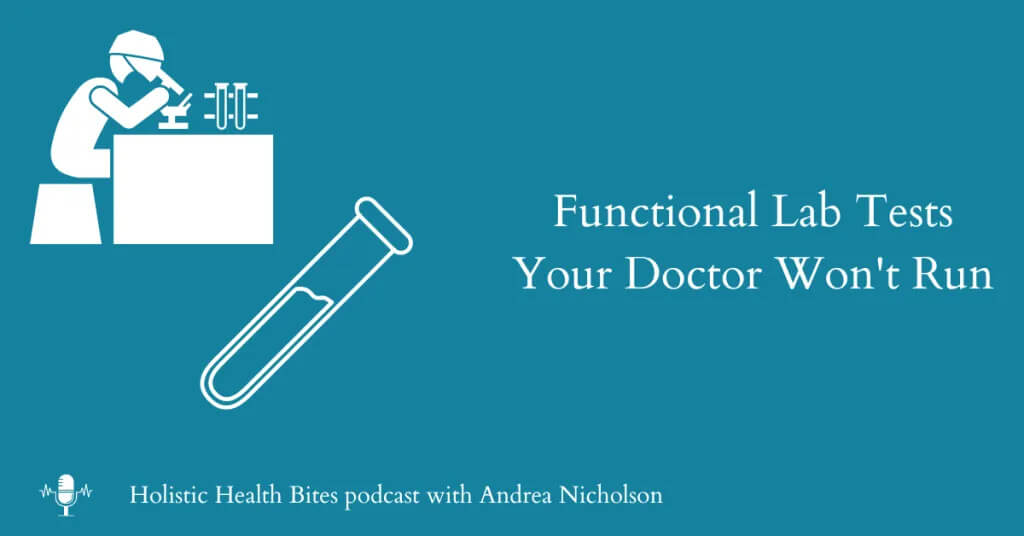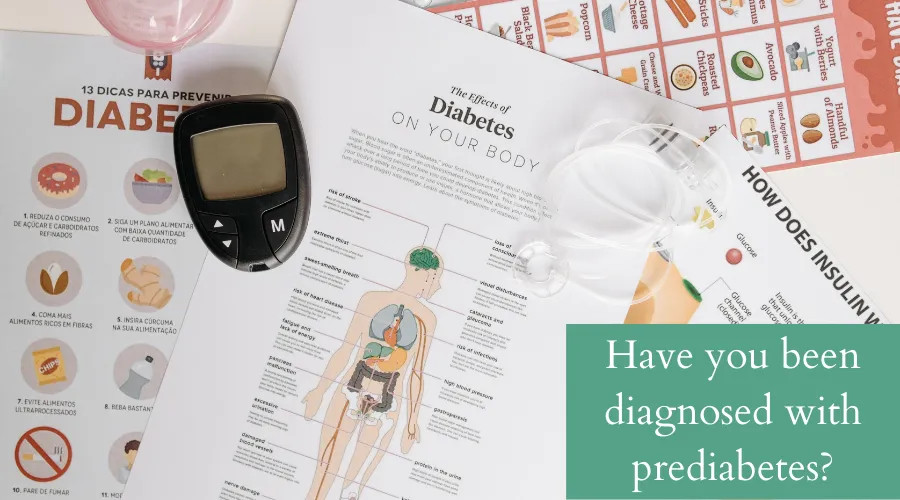
Today we’re talking about functional lab tests your doctor won’t run (and likely doesn’t even know about)!
Let me first start by explaining the differences between conventional medical lab testing and functional lab testing.
Let’s start with conventional lab testing you’d likely see through your general physician:
These panels are primarily looking for levels of markers necessary to sustain life – so they can be run for diagnostic purposes, for screening purposes or for ongoing monitoring. This includes a CBC (complete blood count) and sometimes a CMP (or comprehensive metabolic panel). The CBC is looking at various components of the cells in your blood – red blood cells, white blood cells, and platelets, hematocrit (% of plasma), hemoglobin (blood protein that carries oxygen), MCV/MCH/MCHC are markers of the size and physical characteristics of your red blood cells, and a breakdown of the types of white blood cells present in your blood.
The CMP or comprehensive metabolic panel looks at 18 additional markers highly related to the liver, kidneys, and metabolism: ALT & AST (liver), Albumin (carrier protein), Globulin (protein), total protein (albumin + globulin), A/G ratio, eGFR, Alkaline phosphatase (enzyme), CO2, bilirubin, BUN (blood urea nitrogen; kidney), creatinine (protein), BUN/creatinine ratio, calcium, chloride (electrolyte), glucose, potassium, sodium.
Together these two tests do provide a lot of information – and they’re commonly run in the functional world as well. However, they leave many very helpful markers out that functional medicine providers can use to assess imbalances long before they become disease!
Conventional medical providers also often run a standard lipid panel – which would include total cholesterol, LDL, HDL, and triglycerides. These are again helpful markers, but don’t tell us the whole story.
Functional Lab Tests Your Doctor Won’t Run
Now, let’s turn our attention to functional lab testing that your doctor likely doesn’t know anything about (or wouldn’t be allowed to run under the insurance paradigm). Let me first preface this by saying I am NOT covering all possible tests available – as there are thousands of different tests on the market that can be used in various health challenges. I’m only covering some of the tests or markers that I would recommend everyone have done! I’ll briefly mention some additional types of tests available at the end, but I won’t be going into great detail.
- Stress and Metabolic Profile – this is a saliva test that looks at your daily cortisol rhythm, fasting and non-fasting insulin, DHEA hormone, and secretory IgA (a marker of immune function). I love this panel because it’s non-invasive, inexpensive, and provides a lot of great detail about how your body is functioning. With these results we can take a holistic approach to addressing stress handling, hormone imbalances, immune health, blood sugar handling, and overall brain-body communication. This is my favorite test to start clients with because it provides a high level, yet detailed overview of what’s going on in your body. Many clients find complete relief from their health challenges through addressing imbalances found on this test.
- Fasting insulin – this is the first of the blood sugar handling markers to become dysregulated. When the first signs of insulin resistance are developing, insulin will start to rise because the body is not responding to the presence of insulin. You’ll start producing more and more insulin to do the job. If we look at a fasting insulin we can catch this elevation potentially decades before Diabetes develops. Unfortunately most doctors don’t run this because there is no diagnosis they can provide, and no medication or procedure to fix it. It’s all diet and lifestyle! This is such a cheap marker, its astounding that more doctors won’t run it!
- Comprehensive thyroid testing – this blood test includes TSH, free T3, total T3, free T4, total T4, reverse T3, TPO antibodies, and TGB antibodies. This full panel tells us how the communication between the brain and thyroid is working and how your body is producing and using the various forms of thyroid hormones. The antibodies give us information about potential autoimmune thyroid processes.
- Apo A1 and Apo B – these are little known markers related to cholesterol that can be obtained via blood test. Apolipoproteins are proteins involved in lipid metabolism. Apolipoprotein A1 (or ApoA1) is associated with HDL. Apolipoprotein B (or ApoB) is associated with VLDL, IDL, and LDL, and lipoprotein (a). These two markers individually provide enhanced detail into the various types of lipoproteins you have and we can evaluate the ratio between the two for assessing overall risk factors. Current research is showing that these are far superior markers as compared to the standard lipid panel.
- Comprehensive iron panel – many doctors don’t look at iron at all, but iron plays a key role in carrying oxygen throughout your body. Both too much and too little iron is problematic. The comprehensive blood panel looks at total iron (found in the blood, attached to carrier protein transferrin; last marker to show imbalances), total iron binding capacity (approximation of the amount of transferrin), iron saturation (how much transferrin has iron attached), and ferritin (storage form of iron). When we look at all of these markers we can more fully assess any iron handling imbalances.
- Stool tests – millions of people are struggling with digestive issues. This is a very common problem I see in my practice. There are multiple different stool tests on the market that assess not only your gut microbes, but also your intestinal health. My favorite stool test is called the GI MAP. This test evaluates the normal bacteria, opportunistic or overgrowth bacteria, viruses, fungi, protozoa, worms, and several intestinal markers related to digestive and intestinal health. This is a simple at home test where you collect a small portion of your stool that gets shipped back to the lab.
- Vitamin D – this is another simple, cheap and HIGHLY informative test that provides insights into your vitamin D status. Vitamin D is a fat soluble vitamin and also acts as a hormone in the body. It has hundreds of roles related to bone health, calcium regulation, inflammation, immune system, mood and brain health.
- Inflammation markers and cardiovascular risk – hs CRP, CRP, homocysteine – these are just a few of the inflammation markers that can be looked at in a blood test that provide great insight into inflammatory processes in the body related to cardiovascular health, generalized inflammation, and oxidative damage. CRP (C-reactive protein) is a marker of acute phase inflammation (within first couple of hours of the inflammatory process) and generalized inflammatory processes. hs-CRP is a more sensitive test that evaluates cardiovascular risk. Homocysteine is an amino acid that is often looked at to assess vitamin deficiencies of B12, folate, and B6.
- Adrenal testing – this can be done via saliva or urine and looks at cortisol and cortisone rhythms throughout the day. The tests I use collect at least 4 samples at specific times over a day to establish what your levels are at different points throughout the day. Some tests also evaluate the metabolites of cortisol as it is broken down and eliminated from the body. These tests often also evaluate DHEA and some additional markers that relate to evaluating your overall health. If you happen to have high cortisol and low DHEA, your body is in a state of breakdown – which can lead to loss of muscle, bone, and healthy tissue. Your adrenal glands have many roles related to energy, stress handling, blood sugar handling, mineral balance, and every system in the body.
- Comprehensive hormone testing – this again can be collected via saliva or urine and evaluates estrogen, progesterone, and testosterone. Many tests also include the cortisol and DHEA testing discussed previously. There are different recommended tests depending on male or female, cycling or non-cycling females, and the overall goals of the testing. Fertility-related testing would be very different than what a male or post-menopausal female would undergo. This information can be helpful for clients experiencing hormone imbalance issues – low libido, PMS, PMDD, infertility, amenorrhea, short/long cycles, hot flashes, cramps, breast tenderness…and also bone health, muscle loss, weight gain around the middle, skin changes, and more.
In addition to these panels that can be applicable to a wide range of client needs, there are additional functional tests specific to individual needs – heavy metal toxicity, environmental toxicity, mold, Lyme disease, genetic testing, micronutrient testing, and more that could be valuable if the basics haven’t addressed your health concerns.
So, there you have my list of 10 tests that your doctor is unlikely to order (or even know about)…but I believe many people would benefit from. Now, to be clear, I don’t run all of these on every single client. I start with the basics and add on if needed!
If you’re interested in learning more or having some of these tests run for yourself – I’m here to help.





















0 Comments